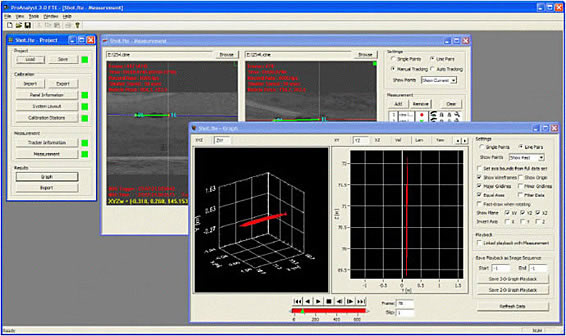Overview
The new Flight Tracker edition of the 3-D FlightPath software is the world's first software package to combine data from two high-speed video cameras and two rotating-mirror flight trackers to measure projectile flight dynamics in 3-D. This revolutionary software package allows range engineers to quantify flight characteristics over long distances (e.g., 100 meters or more). The Flight Tracker edition utilizes the same image processing, graphing, auto-tracking, reporting and 3-D reconstruction algorithms found in Xcitex's other acclaimed 3-D FlightPath editions.
This 3-D FlightPath software has been installed using both Flight Followers from MS Instruments (UK) and Trajectory Trackers from Specialised Imaging (UK), so you can use your existing hardware and cameras.
Software Features
- Ideal for continuous measurements over long flight lines
- Requires just two high-speed cameras and two Flight Followers or Trajectory Trackers
- Two-part calibration technique can be accomplished in just a few hours
- Same-side range architecture simplifies setup and cabling
- Same analysis results as other 3-D FlightPath packages

This 3-D FlightPath edition captures and quantifies projectile motion along a flight path to produce pitch, yaw, speed, and position data, and to calculate deviation from ideal flight-line. This software requires only two high-speed cameras and two flight trackers - no need for a third camera at the gun. Cameras can be placed on the same side of the flight line to provide range engineers the maximum flexibility during test set-up and to minimize cable runs. The revolutionary 2-part shot line calibration can be performed in a short period of time with low-cost components and a laser range finder - no need for geometric surveys or theodolites.
This edition is being used at multiple large government-sponsored projectile test ranges where it has been rigorously testing and benchmarked to yield higher accuracy results than competitor packages. Projectiles, fragments, non-lethals, sabots and other objects can be tracked through the videos as either single objects or tip-tail pairs. Time and position data is captured from the mirror trackers and video cameras.
![]()